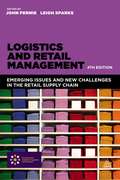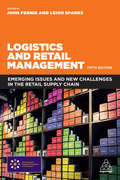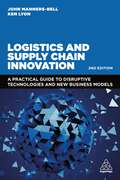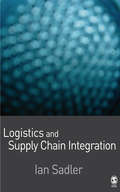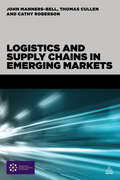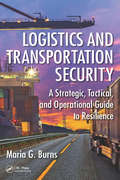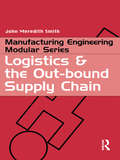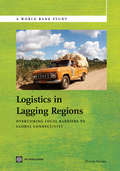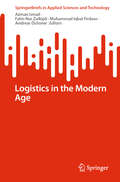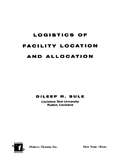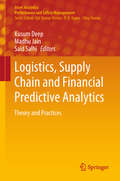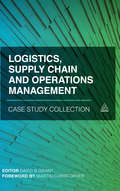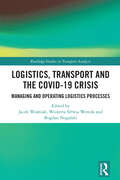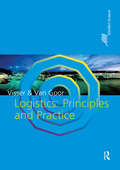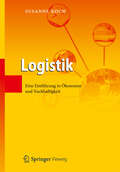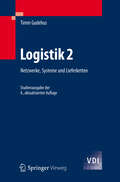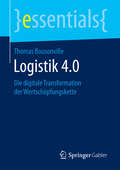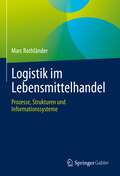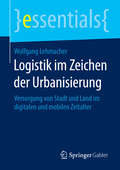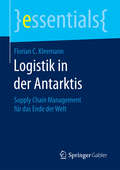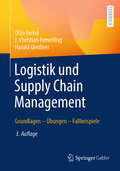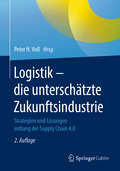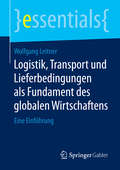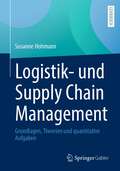- Table View
- List View
Logistics and Retail Management
by Leigh Sparks John FernieThe fourth edition of Logistics and Retail Management has been substantially updated to take account of recent developments in retail logistics. Retailers have recognised the need to have more involvement in supply chains and noted that benefits can be achieved in both service levels and cost reduction. Notwithstanding the major strides made, numerous challenges remain, and new issues are constantly emerging. This book brings together well-known academics and practitioners, who share their research, ideas and experience of current thinking on supply chain management in retail. Reflecting the changing needs of the global marketplace and responding to the challenges faced by retailers, this new book features a chapter on International Fashion Supply Chain Management and another on CSR and the textile supply chain.
Logistics and Retail Management: Emerging Issues and New Challenges in the Retail Supply Chain (Transport And Logistics Ser.)
by Leigh Sparks John FernieLogistics and supply chains play a vital role in the overall success of retail management. This fifth edition of Logistics and Retail Management covers the major strides made in retail logistics and the challenges which remain, providing students and professionals with the current thinking and research in this strategic field. Including chapters on internationalization, corporate social responsibility (CSR), and green logistics, the book also explores examples from successful organizations such as Schuh and Tesco. Fully updated with the latest international developments and on-going changes in the field, Logistics and Retail Management, 5th edition is a multi-contributed collection from leading academics and practitioners and an expert editor team. The new edition also includes material on the luxury fashion industry and the logistical challenges of e-commerce. Logistics and Retail Management, 5th edition is the essential text for students of retail logistics and supply chain management, now with supporting online resources.
Logistics and Supply Chain Innovation: A Practical Guide to Disruptive Technologies and New Business Models
by John Manners-Bell Ken LyonGlobal disruption, new technologies and changing consumer habits are causing turmoil in the supply chain industry. This book shows businesses how to remain resilient in this dynamic new environment.The supply chain crisis of 2021 exposed the necessity of a sustainable supply chain. The Fourth Industrial Revolution has transformed our society and economy. The logistics and supply chain industry continues to be innovated by automation, blockchain and sustainability. Amid all this volatility, it is vital for businesses to not only protect their operations from disruption, but to rise to the challenge that these innovations pose to become game-changers in their sectors.Now in its second edition, Logistics and Supply Chain Innovation provides vital insight into the major trends transforming the supply chain and logistics industry. Featuring a new section on the role of technologies in reducing carbon emissions, case studies from companies such as Amazon, Alibaba, Maersk, UPS and DHL, as well as a full update of all existing content on crowd sourcing and shipping, on-demand delivery, autonomous vehicles and more, Logistics and Supply Chain Innovation is the essential guide to thriving in a rapidly developing logistics landscape. Online supporting resources include PowerPoints and sample case studies.
Logistics and Supply Chain Integration
by Mr Ian SadlerFor students who want to advance their understanding of company logistics and supply chains, the author examines how a number of firms in a supply chain work together to create a flow of products and services that satisfies end customers, whilst enabling all the manufacturing and service companies involved to grow profitably. Including the most recent concepts and theoretical advances to emerge from the field of logistics and supply chain management, this text informs and assists its readers with the aid of case studies and accompanying questions, diagrams, photos and an accompanying website.
Logistics and Supply Chains in Emerging Markets
by John Manners-BellEmerging Markets hold the key to the development of the global logistics industry over the next twenty years. Whilst developed economies struggle to come to terms with huge levels of debt, newly industrialized markets are showing strong growth prospects as manufacturers and investors look at low cost production locations. This, in turn, has led to urbanization and the development of more affluent middle classes in regions such as Middle East, Africa, Latin America and Asia Pacific.In this unique new book, John Manners-Bell will include a section on the key trends affecting development of emerging markets; the social, economic and political context; the reasons behind their integration within the global trading economy; the main challenges (security, corruption, transport infrastructure). There are individual sections on the BRIC transport and logistics sectors, as well as prospects for Asia, Latin America, Africa, Central Asia, Middle East (impact of the Arab Spring, Syria) and much more. A survey section showing the best markets to invest in is also included to download.
Logistics and Transportation Security: A Strategic, Tactical, and Operational Guide to Resilience
by Maria G. Burns"Professor Burns has captured the essence of transportation security, one of today's most pressing concerns. As the rate of globalization and world trade increases, security and supply chain resilience are at the core of one‘s global transportation network. This is a timely and well written contribution to the industry." John A. Moseley, Senior Dir
Logistics and the Out-bound Supply Chain
by John Meredith SmithThe control and organisation of the flow of goods in the supply chain is of vital importance to industry and commerce, including manufacturing industrial enterprises, where the timely and efficient delivery of their output at an economic cost is of great concern. This book considers the out-bound supply chain and the associated out-bound logistics ie the flow of goods from the point of production or manufacture to the point of consumption. In doing so, it has to cover a range of management topics and techniques, including measures of performance, order management and forecasting, stock management and management of the supply chain. Written in clear and jargon-free language, this book, whilst intended primarily students of engineering and manufacturing, at 3rd year undergraduate and postgraduate level, would also be of interest to logistics and operations management students. Typical examination questions are included.
Logistics in Lagging Regions: Overcoming Local Barriers to Global Connectivity
by Charles KunakaSmall scale producers in developing countries lack easy access to efficient logistics services. They are faced with long distances from both domestic and international markets. Unless they consolidate their trade volumes they face high costs which diminish their ability to trade. However, the process of consolidation is not without cost nor does it occur on its own accord. As a result, the consolidation is typically handled by intermediaries. Using case studies of sisal and soybean supply chains in Brazil and India respectively, this study explores the role and impact of intermediaries in facilitating trade in lagging regions. The study assesses the horizontal relationships between the small scale producers in thin markets and the vertical connections between different tiers of the same supply chain. The study analyzes the traditional approach to linking producers namely through cooperatives and itinerant traders and the relatively newer innovations using ICT. The study finds that farmers linked through the different mechanisms are more integrated to international supply chains or are able to better manage supply chains longer than would otherwise be the case. Intermediaries play several roles including providing transport services and facilitating market exchanges, payments, risk sharing and quality improvements. Generally, information technology driven innovations make it easier to integrate adjacent steps in the value chain. This report on logistics performance at the sub-national level is an on-going endeavour. Similar analysis is being carried out in some countries in Africa to identify the evolving role of intermediaries in low income regions. The results will be developed into a major publication on this topic, with recommendations on how development agencies, civil society and the private sector can improve the design of strategies to reduce logistics costs in low income areas.
Logistics in the Modern Age (SpringerBriefs in Applied Sciences and Technology)
by Andreas Öchsner Azman Ismail Fatin Nur Zulkipli Muhammad Iqbal FirdausThis book delves into a diverse array of topics, from optimizing trucking haulage to analyzing the impact of service quality on customer satisfaction, spanning air cargo, e-commerce, shipping, and more. This book navigates through a series of meticulously researched chapters, uncovering the intricate web of factors that shape the logistics industry in the modern era. This book serves as an indispensable resource for logistics professionals, academics, and students. It is not just a glimpse into the industry's present and future; it is a roadmap for companies seeking to thrive in the ever-changing logistics landscape by prioritizing customer satisfaction and efficiency.
Logistics of Facility Location and Allocation
by Dileep R. SuleAn introduction to pragmatic methods for solving complex problems in facilities location: choosing from among known feasible sites or a broad range described as an area, placing facilities, and assigning customers. It emphasizes careful location and customer allocation to determine optimum use of time and cost - improving flow of materials and services and reducing the need for duplication or construction redundancies.
Logistics, Supply Chain and Financial Predictive Analytics: Theory And Practices (Asset Analytics)
by Kusum Deep Madhu Jain Said SalhiThis book addresses a broad range of problems commonly encountered in the fields of financial analysis, logistics and supply chain management, such as the use of big data analytics in the banking sector. Divided into twenty chapters, some of the contemporary topics discussed in the book are co-operative/non-cooperative supply chain models for imperfect quality items with trade-credit financing; a non-dominated sorting water cycle algorithm for the cardinality constrained portfolio problem; and determining initial, basic and feasible solutions for transportation problems by means of the “supply demand reparation method” and “continuous allocation method.” In addition, the book delves into a comparison study on exponential smoothing and the Arima model for fuel prices; optimal policy for Weibull distributed deteriorating items varying with ramp type demand rate and shortages; an inventory model with shortages and deterioration for three different demand rates; outlier labeling methods for medical data; a garbage disposal plant as a validated model of a fault-tolerant system; and the design of a “least cost ration formulation application for cattle”; a preservation technology model for deteriorating items with advertisement dependent demand and trade credit; a time series model for stock price forecasting in India; and asset pricing using capital market curves. The book offers a valuable asset for all researchers and industry practitioners working in these areas, giving them a feel for the latest developments and encouraging them to pursue further research in this direction.
Logistics, Supply Chain and Operations Management Case Study Collection
by David B. GrantLogistics, Supply Chain and Operations Management Case Study Collection is a rich and varied compilation of relevant case studies from across logistics, supply chain management and operations. It contains real life scenarios from leading companies including Volvo, Vortex, Honda of America, Green Cargo and Swedish Transport Administration. It includes a foreword by Martin Christopher. Comprehensive in scope and scrupulous in detail, Logistics, Supply Chain and Operations Management Case Study Collection includes actual events experienced by businesses of every size, from SMB's to some of the most successful corporations in manufacturing, transportation, hospitality and other industries. In these pages readers will discover proven tactics and innovative solutions for handling uncertainties, solving problems and circumventing risk, plus a wealth of information to guide strategy and decision making. Readers who are involved in logistics and supply chain management will find the collection extremely helpful. Directors and managers will find immediate application of strategies and tactics to their own situations and challenges and learn to identify potential pitfalls before they become chronic issues. Training professionals will have a valuable tool for testing management proficiency in crisis mitigation and resolution, and particularly useful in academic curriculum, independent learning modules and professional training programs. Academics and professional trainers will benefit from expanded question and answer sections designed to measure knowledge transfer and lessons learned. Students will learn from engaging, topical situations that are highly relevant to the fields of logistics, supply chain management and operations, and both students and prospective managers will learn crucial skills to meet current challenges, qualify for professional advancement and achieve success.
Logistics, Transport and the COVID-19 Crisis: Managing and Operating Logistics Processes (Routledge Studies in Transport Analysis)
by Jacek Woźniak Wioletta Sylwia Wereda Bogdan NogalskiUnder and post COVID-19 conditions, companies are adapting to smart ways of operating and managing logistics processes to counteract the negative implications of the pandemic. This book offers an analysis and guidance on how to manage these processes, including transport, inventory, operations and waste management, to meet the complex need of enterprises. This edited collection presents selected and key aspects of the implementation of logistics processes in the conditions of the COVID-19 pandemic, enriched with empirical analyses and international examples. The book is a contribution to the considerations on the role and importance of logistics processes in the management of organisations in the conditions of the COVID-19 pandemic, as well as reducing its negative socio-economic and technological effects. With contributions from global scholars, the book demonstrates the direction in which logistics processes should change so that they can take the form of "smart". Logistics, Transport and the COVID-19 Crisis will be directly relevant for researchers and academics across logistics, supply chain management, and transport management as well as risk management and related fields.
Logistics: Principles and Practice
by Hessel VisserLogistics: Principles & Practice is a general introduction to the subject. This specialized field is fast moving – fulfilling orders on time is of crucial importance in the modern age of internet economy and just-in-time production. Besides dealing with the logistics of purchasing, production and distribution, the book also examines common ground with marketing, quality and production design. This integrated approach ensures that important topics such as e-business, CRM, process design, E-procurement, enterprise resource planning and E-logistics are given prominent coverage. This textbook can be used as core reading for all students of logistics and operations management.
Logistik
by Susanne KochDer globale Handel stellt neue Herausforderungen an die Logistik - sowohl aus ökonomischer wie aus ökologischer Sicht. In dem Lehrbuch werden die für Transport, Speicherung und Handhabung von Gütern benötigten Prozesse betrachtet. Behandelt werden die Grundlagen der Logistik, Controlling und Supply Chain Management sowie eine nachhaltig orientierte Logistik (Green Logistics), die ökonomische und ökologische Fragestellungen miteinander verbindet. Der einführende Band eignet sich zum Selbststudium ebenso wie als Lehrbuch für einen einsemestrigen Kurs.
Logistik
by Timm GudehusZentrale Aufgabe der operativen Logistik ist das effiziente Bereitstellen benötigter Mengen zur rechten Zeit am richtigen Ort. Das Standardwerk behandelt die Grundlagen und das Handwerkszeug zur kreativen Bearbeitung der vielfältigen Logistikaufgaben, der innerbetrieblichen (Intralogistik) wie außerbetrieblichen Logistiknetzwerke. Es bietet praxiserprobte Strategien und Optimierungsverfahren sowie Regeln, Algorithmen und Formeln für die rechnergestützte Planung von Logistiksystemen und für die dynamische Disposition in Versorgungsnetzen.
Logistik 4.0: Die digitale Transformation der Wertschöpfungskette (essentials)
by Thomas BousonvilleDas Buch bietet eine Orientierung in der Begriffswelt von Logistik 4. 0. Es erl#65533;utert die technologischen Grundlagen und stellt die Bez#65533;ge zu verwandten Begriffen wie ,,Industrie 4. 0" und ,,Internet der Dinge" her. Die Auswirkungen der Digitalisierung der Wertsch#65533;pfungskette, insbesondere der umfassenden Vernetzung der Objekte des Warenflusses in den Bereichen Transport, Lagern und Produktionslogistik werden dargestellt. Dies geschieht anhand von konkreten Beispielen, die das Zusammenspiel der technologischen Komponenten von ,,Logistik 4. 0" zur Gestaltung neuer oder verbesserter Gesch#65533;ftsprozesse illustrieren. Au#65533;erdem wird auf die rechtlichen Rahmenbedingungen datengetriebener Gesch#65533;ftsmodelle eingegangen.
Logistik im Lebensmittelhandel: Prozesse, Strukturen und Informationssysteme
by Marc RothländerHandelsunternehmen befinden sich durch ökonomisch-technologische, ökologische und soziale Herausforderungen in bedeutenden Veränderungsprozessen. Dabei stehen die zunehmende Digitalisierung und nachhaltige Gestaltung von Geschäftsprozessen im Vordergrund. Hinzu kommen demographische Veränderungen, neue Kundenanforderungen, gesetzliche Rahmenbedingungen und ein steigender Wettbewerbs- und Kostendruck. Dies trifft insbesondere auch auf den Lebensmittelhandel in Deutschland zu. Dieses Buch beschreibt sehr anschaulich die logistischen Grundlagen und Besonderheiten der Lebensmittelbranche. Zahlreiche Beispiele zeigen die aktuellen Entwicklungen in den Bereichen Management, Prozesse, Strukturen sowie Informationssysteme.
Logistik im Zeichen der Urbanisierung: Versorgung von Stadt und Land im digitalen und mobilen Zeitalter (essentials)
by Wolfgang LehmacherDieses Essential beleuchtet die Auswirkungen des Megatrends Urbanisierung und sucht nach logistischen Lösungen unter besonderer Berücksichtigung der digitalen und mobilen Revolution. Weltweit ziehen Menschen in großer Zahl in die Städte - mit schwerwiegenden logistischen Folgen: Während die Versorgung in ländlichen Regionen immer aufwändiger und unrentabler wird, nähern sich die Städte dem Verkehrsinfarkt. Wird die ,,letzte Meile" zu einer unlösbaren Herausforderung? Entwickelt sich die Versorgung der Menschen in urbanen Zentren und ländlichen Regionen zur wirtschaftlichen Misere? Wolfgang Lehmacher gibt Antworten auf diese zentralen Fragen. Mittels konkreter Beispiele möchte dieses Essential nicht nur zum Weiterdenken anregen, sondern zur Verbesserung der Versorgungslage in den Städten und in ländlichen Gebieten beitragen.
Logistik in Wissenschaft und Praxis: Von der Datenanalyse zur Gestaltung komplexer Logistikprozesse
by Stefan Winter Jacob Lohmer Roy FritzscheDieser Sammelband besteht aus aktuellen wissenschaftlichen Beiträgen aus allen Fachbereichen, die Prof. Lasch in seiner Wirkungszeit am Lehrstuhl für BWL, insb. Logistik, erforscht hat und weiterhin erforscht. Kolleg*innen, Schüler*innen und Freunde wurden eingeladen, einen wissenschaftlichen Artikel zu dieser Festschrift beizutragen. Die wirtschaftswissenschaftlichen Themengebiete umfassen Digitalisierung und Optimierung der Beschaffung, Supply Chain Management und Supply Chain Risk Management, Industrie 4.0 und digitale Technologien in der Logistik und SCM, Komplexitätsmanagement in der Logistik und SCM, Produktionsplanung und -steuerung sowie Intralogistikplanung und die Optimierung von Logistikprozessen in der humanitären Hilfe.
Logistik in der Antarktis: Supply Chain Management für das Ende der Welt (essentials)
by Florian C. KleemannFlorian C. Kleemann erarbeitet erstmals f#65533;r die internationale Logistik ein fundiertes Regionenprofil der Antarktis, des wei#65533;en Kontinents am s#65533;dlichen Ende der Welt. Der Autor analysiert dabei logistische Rahmenbedingungen im Bereich Politik, Recht, Wirtschaft und Klima. Fallstudienbasiert werden zudem wesentliche Besonderheiten f#65533;r die antarktische Logistik herausgearbeitet und in den Kontext eines modernen ,,Supply Chain Management" eingebettet. Bez#65533;ge bestehen dabei zur logistischen Infrastruktur, zu besonderen Transport- und Ladungstr#65533;gern sowie zu spezifischen Planungs- und Managementanforderungen. Neben tiefen Einblicken in die Besonderheiten der Logistik in Polarregionen entsteht so ein Analyseraster, das auch f#65533;r etablierte logistische Weltregionen genutzt werden kann. Zudem werden pragmatische Handlungsempfehlungen f#65533;r Logistiker und Supply Chain Manager bereitgestellt.
Logistik und Supply Chain Management: Grundlagen – Übungen – Fallbeispiele
by J. Christian Femerling Otto JockelDieses Buch ist ein auf die Bachelor-Ausbildung abgestimmtes und leicht verständliches Basiswerk sowie Arbeitsbuch zur Logistik. Es stellt die logistischen Grundlagen und die wichtigen Teilgebiete modular und anschaulich dar. Jedes Kapitel enthält Lernziele sowie zahlreiche Fallbeispiele, die das jeweilige Themengebiet mit Praxisfällen ergänzen.Die 3. Auflage wurde aktualisiert und grundlegend überarbeitet. Neue Kapitel heben insbesondere die Bedeutung von Wertschöpfungs-, Güter- und Logistikketten hervor. Ergänzungen umfassen Themen wie Kreislauf- und Entsorgungswirtschaft, Instandhaltungs- und Ersatzteillogistik. Ein zusätzliches Kapitel zum Supply Chain Risk Management analysiert Risiken wie Naturkatastrophen, geopolitische Konflikte und Handelsbeschränkungen, die globale Netzwerke erheblich beeinflussen. Es unterstreicht die Notwendigkeit eines ganzheitlichen Risikomanagements, unterstützt durch innovative IT-Systeme. Darüber hinaus wurden branchenspezifische Lösungen für die Chemie-, Textil- und Lebensmittelindustrie erweitert sowie Einblicke in zukünftige Trends und Entwicklungen beschrieben, die das Supply Chain Management und die Logistik gestalten und beeinflussen.
Logistik – die unterschätzte Zukunftsindustrie: Strategien und Lösungen entlang der Supply Chain 4.0
by Peter H. VoßDieses Buch stellt die vielfältigen Prozesse, Einflussgrößen und Perspektiven der Logistikindustrie anschaulich dar. Dabei reicht das Themenspektrum von der Digitalisierung der Supply Chain mit IoT, Machine Learning, Data Mining, Blockchain und Big Data über Automatisierung in der Lager-/Transportlogistik und des Onlinehandels bis hin zur Organisation der letzten Meile, zu Fragen des Versicherungswesens, der Sicherheit sowie zur Haftung von Logistikunternehmen. Die Autoren – renommierte Vertreter der Logistik oder kooperierender Branchen, Unternehmensberater und Wissenschaftler mit langjähriger Erfahrung auf dem Logistiksektor – bieten einen spannenden Blick auf die gegenwärtigen und zukünftigen Trends der Logistik.
Logistik, Transport und Lieferbedingungen als Fundament des globalen Wirtschaftens: Eine Einführung (essentials)
by Wolfgang LeitnerWolfgang Leitner erläutert ausgewählte Teilbereiche der Transport-, Umschlag- und Lager-Logistik (TUL-Logistik). Denn die operationalen Prozesse der TUL-Logistik haben in den letzten Jahren insbesondere durch die Globalisierung von Beschaffung, Produktion und Distribution an Bedeutung gewonnen. Naturgemäß hat sich allerdings auch deren Komplexitätsgrad entsprechend erhöht. Dies gilt sowohl in den Dimensionen Flexibilität, Lieferzeit und Liefertreue sowie den Kostenanforderungen aufgrund der Bedürfnisse des Marktes bzw. der Konsumenten als auch aufgrund der steigenden Modularität der Produkte und damit der Wertschöpfungsketten.
Logistik- und Supply Chain Management: Grundlagen, Theorien und quantitative Aufgaben
by Susanne HohmannDieses Buch betrachtet die grundlegenden logistischen Bereiche zur Beschaffung, Produktion, Distribution und Entsorgung im Logistikmanagement und zeigt, welche Themen und Aspekte das Logistikmanagement umfassen. In der Logistik geht es vor allem um die Optimierung des Materialflusses, der Kapazitätsauslastung, der Transportstrecke oder der Maschinenbelegung. Für den Bereich des Supply Chain Management wird die Funktionsweise, Koordination und Resilienz der Supply Chain auch vor dem Hintergrund aktueller Lieferkettenstörungen und der Einführung des Lieferkettensorgfaltspflichtengesetzes beschrieben.Das Buch ermöglicht, anhand von zahlreichen Anwendungs- und quantitativen Übungsbeispielen, das im Studium benötigte Wissen leicht nachvollziehbar zu erlangen und zu vertiefen.
